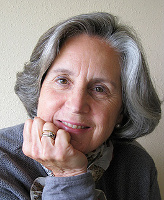
Image by Sasin Tipchai
I have believed all my life that there is a necessary interaction that occurs between a person and the Divine. This interaction does not come only to prophets, bodhisattvas, and other great spiritual masters, it comes also to us: ordinary people in our ordinary lives. It is part of our natural human capacity to call out one of the thousand names of "God." And it is part of our human capacity to perceive and interpret the response.
Call and response is perhaps the oldest impulse we know. Humankind has always looked up and bowed down before the mysteries of the universe and asked God to become present. Moses, Buddha, Jesus, Mohammed -- religions arise from a lineage of trembling prophets who understood that, if summoned, God might actually appear.
Their stories say these were ordinary men and women who were pulled out of their ordinary lives into the service of what they summoned forth. Knowing this, we stand in our own ordinariness and surmise that God might also actually appear to us and break us open to the life of service hiding within everyday details.
What an amazing opportunity we have, to discover our own language of call and God's own language of response -- and to take responsibility, that as the times we live through become less ordinary, we ourselves become less ordinary in response to the needs of the times.
Knowing What God Looks Like
My family tells a story that when I was a girl of five or six years, I set about scribbling furiously on a large sheet of paper my mother had put down on the floor.
Crayons scattered around me, tongue stuck out in concentration, I worked the colors onto the page. The texture of the linoleum came up through the paper, adding surprise designs to my drawing, which seemed to appear like magic. My mother wandered by and asked me, "What are you drawing?"
"A picture of God," I replied.
My mother knelt down to deliver her disappointing news as gently as possible. "Oh honey, you can't do that.... Nobody knows what God looks like."
I hear that I did not even lift my gaze from the enthrallment of my artwork as I informed her, "They will, as soon as I'm done with my drawing."
The Thousand Faces of The Divine
Connection to what theologian Joan Chitester calls "the One whose heart beats with ours" is part of our natural human capacity. And though children often have a natural and confident connection with the Divine, in the long journeys through religious training and enculturation, many people become adults no longer sure what they think about God, whether they know what "God" is or what "God" looks like.
In my own journey, the more I read, and the more I experience, the more mysterious the Divine becomes. I grew up a Protestant Christian with the Lord as my shepherd and little squares of white bread and grape juice served once a month in church. I marveled over the elaborate prayers of playmates who wore white veils to their first communion and prayed to Mother Mary and a host of what I called "the saints and saintesses." Down the road, if I stayed till Friday dusk at Howie Bernstein's house, his mother sang exotic prayers, lit candles, and sent me home with a piece of warm challah in my hand.
In my twenties, I grounded my spirit in Quaker Meeting and social activism, followed by eclectic reading in world religions, and adult confirmation as an Episcopalian. My religious training has been augmented by insights from indigenous spiritual traditions; studies in shamanism and Celtic spirituality; practices in yoga, chi gong, and vipassana meditation; and long walks in nature with my dog.
All I know is there are a thousand faces of the Divine, and a thousand ways to pray. Every minute of life presents an essential choice: to avail ourselves of this relationship, or to close up in isolation.
Reclaiming a Personal Relationship to the Divine
We know there is power in spirit that can answer our prayers and change our lives, but we may not be sure what to pray for, or how ready we are to have our lives changed, thank you very much, God.
We know there is power in spirit that can decode the mystery of life, but it's Tuesday, and we have a long list of things to do. We put off our willingness to entertain spiritual transformation day by day.
Yet, no matter how ambivalent we are, no matter how liberal or conservative our religious and spiritual views, our longing for active relationship with something greater than ourselves cannot be forever denied. This longing may be the capacity that saves us in times like these. It is not a movement toward a specific religion, or away from religion: it is a movement to reclaim a personal relationship with the Divine.
 Among humankind are millions and billions of good-hearted, good-natured, well-meaning people. I believe these people -- including you and me -- can redirect the course of history. We have already started. Millions of us are willing to reappraise social and personal values, and even change core beliefs, based on new and increasing information and insight about the world.
Among humankind are millions and billions of good-hearted, good-natured, well-meaning people. I believe these people -- including you and me -- can redirect the course of history. We have already started. Millions of us are willing to reappraise social and personal values, and even change core beliefs, based on new and increasing information and insight about the world.
Millions of us contribute to the common good through billions of small and yet significant acts of kindness and compassion. And millions of us are looking for some connection to spirit so real, so unmistakably authentic, that it will release our capacity to make an enormous shift in how we treat each other and the world.
Answer Your Phone, Spirit Is Calling
Sometimes I think of the connection to spirit as being like a phone line. The connection is always open: it's our half of the relationship to stay available for incoming calls. Sometimes I turn the ringer off. Sometimes I ignore the ringing. Sometimes I pick up the phone with suspicion. Sometimes I hang up in anger. Sometimes I get impatient at the interruption. Sometimes I have no idea how to respond.
The problem is not in the sending, but in the receiving. And unlike a lot of other calls, the one from spirit is the one we are hoping to receive.
One time, having tea with a friend, we were deep in conversation when the phone rang. I ignored it, thinking I was being polite. Jerry stopped his thought mid sentence and asked, "Aren't you going to get the phone? Maybe God is calling you." I looked at him in amazement, reached for the receiver, and tentatively said, "Hello?..."
I don't remember who was calling, but I have never forgotten Jerry's message to stay curious, to see if I can decode the Divine in everyday interactions. We have in ourselves some mysterious ability, in ordinary moments and moments of extreme, to speak with the voice of God.
Spiritual Commonsense Prayer
In the midst of all this searching, I wake in my house to the first light of day. I go out on the tiny balcony that bulges off the second floor office of my home and stand in the morning air. Usually I'm still wrapped in my bathrobe, sometimes leaning over the railing to watch the garden below, sometimes pressed back under the eaves to keep out of wind or rain.
Usually I have a cup of tea in hand, and a corgi dog curled at my feet. Together we look at the day. I stand among tall trees that encircle my house and frame the view. I imagine putting down my own roots in the rocky clay soil. I watch creatures go by, the neighbor's cat, a suburbanized deer. A bird starts singing and I join it. I remember my own creatureliness, bow to my utter dependence on earth to sustain me and spirit to guide me. Then I say my daily prayer.
The heart of this prayer is a list: a string of seven directions that came into my mind over a period of several months. I think of them as an ecumenical mantra. Their language is universal.
We can observe them inside any spiritual or religious tradition and follow them according to the dictates of personal conscience. They are short, memorable phrases that can be recited as prayer and remembered in moments of need.
I think of them as whispers of spiritual commonsense:
Maintain peace of mind.
Move at the pace of guidance.
Practice certainty of purpose.
Surrender to surprise.
Ask for what you need and offer what you can.
Love the folks in front of you.
Return to the world.
If every day the Divine is attempting to communicate its larger wisdom, then one of the most important things we can do is find a way to listen to spirit.
Reciting these seven whispers is a very simple practice. It doesn't require physical training or stamina. We don't have to travel to exotic and holy sites. We don't even have to get out of bed.
This is the practice -- recite and see what happens. Call and see what responds. Notice how help comes.
Reprinted with permission of the publisher,
New World Library. ©2002, 2005).
www.newworldlibrary.com
Article Source
 The Seven Whispers: A Spiritual Practice for Times Like These
The Seven Whispers: A Spiritual Practice for Times Like These
by Christina Baldwin
In this eloquent work, self-exploration pioneer Christina Baldwin leads readers of all spiritual persuasions to listen intentionally to the voice within their soul: the voice of spirit. She does this by sharing seven meditative phrases — the wisdom gained from listening to her own inner spirit.
Click here for More Info or to Order this book. Also available as a Kindle edition.
More books by Christina Baldwin.
About the Author
 Christina Baldwin has taught seminars internationally for over twenty years. Her first book, One to One, Self-Understanding through Journal Writing (1977) has remained in continuous print since its original publication. Her best-selling book, Life's Companion, Journal Writing as a Spiritual Quest (1990) takes the art of writing and expands it into spiritual practice. In the early 1990's she began exploring how to help people bridge from explorations of personal consciousness to spiritually based social action. She is the author of Calling the Circle, The First and Future Culture (1998) and The Seven Whispers. She founded PeerSpirit, Inc." an educational company, with author and naturalist Ann Linnea.
Christina Baldwin has taught seminars internationally for over twenty years. Her first book, One to One, Self-Understanding through Journal Writing (1977) has remained in continuous print since its original publication. Her best-selling book, Life's Companion, Journal Writing as a Spiritual Quest (1990) takes the art of writing and expands it into spiritual practice. In the early 1990's she began exploring how to help people bridge from explorations of personal consciousness to spiritually based social action. She is the author of Calling the Circle, The First and Future Culture (1998) and The Seven Whispers. She founded PeerSpirit, Inc." an educational company, with author and naturalist Ann Linnea.


























